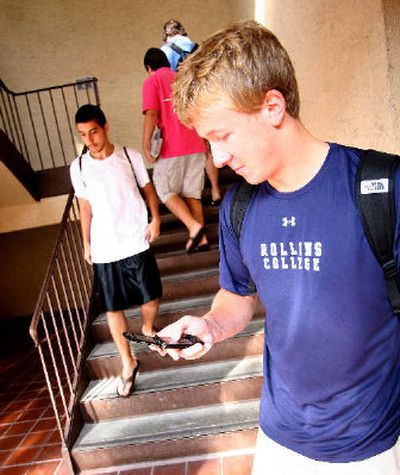Trying to get real

CHICAGO — For some, it would be unthinkable — certain social suicide. But Gabe Henderson is finding freedom in a recent decision: He canceled his MySpace account.
No longer enthralled with the world of social networking, the 26-year-old graduate student pulled the plug after realizing that a lot of the online friends he accumulated were really just acquaintances. He’s also phasing out his profile on Facebook, a popular social networking site that, like others, allows users to create profiles, swap message and share photos — all with the goal of expanding their circle of online friends.
“The superficial emptiness clouded the excitement I had once felt,” Henderson wrote in a column in the student newspaper at Iowa State University, where he studies history. “It seems we have lost, to some degree, that special depth that true friendship entails.”
Across campus, journalism professor Michael Bugeja — long an advocate of face-to-face communication — read Henderson’s column and saw it as a “ray of hope.” It’s one of a few signs, he says, that some members of the tech generation are starting to see the value of quality face time.
As the novelty of their wired lives wears off, they’re also are getting more sophisticated about the way they use such tools as social networking and text and instant messaging — not just constantly using them because they’re there.
“I think we’re at the very beginning of them reaching a saturation point,” says Bugeja, director of Iowa State’s journalism school and author of “Interpersonal Divide: The Search for Community in a Technological Age.”
Though he’s not anti-technology, Bugeja often lectures students about “interpersonal intelligence” — knowing when, where and for what purpose technology is most appropriate.
He points out the students he’s seen walking across campus, holding hands with significant others while talking on cell phones to someone else. He’s also observed them in coffee shops, surrounded by people, but staring instead at a computer screen.
“True friends,” he tells them, “need to learn when to stop blogging and go across campus to help a friend.”
In the meantime, he says, many professors have begun setting their own limits, banning students from surfing the Internet during lectures.
Of course, these forms of communication continue to dominate. In the October issue of the journal Pediatrics, for instance, researchers at Stanford University released findings from an ongoing study of students at an upper-middle income high school in the San Francisco area. One written survey found that the large majority of students were members of at least one social networking site — 81 percent of them on MySpace. They also found that 89 percent of those students had cell phones, most of them with text and Web surfing capabilities.
They are more wired than ever — but they’re also getting warier.
Increasingly, they’ve had to deal with online bullies, who are posting anything from unflattering photos to online threats.
Privacy issues also are hitting home, most recently when students discovered that personal updates on their Facebook pages were being automatically forwarded to contacts they didn’t necessarily want to have the information. Facebook was forced to let users turn off the data stream after they rebelled.
Indeed, Steve Miller, a sophomore at Rollins College in Winter Park, Fla., says social networking can be an “extremely effective” way to publicize events to large groups — and even to help build a sense of community on campus.
He joined Facebook as a way to meet people before he started school, but also quickly learned that it had limitations, too.
“I discovered, after meeting many of these (online) friends, that a good Facebook profile could make even the most boring person somewhat interesting,” says Miller, who’s 19 and now a sophomore.
He’s also not always thrilled with text messaging via cell phones, which can be a quick way to say “have a good day” or to coordinate a plan to meet up at a noisy concert.